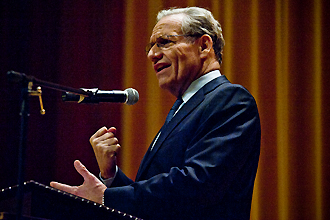Journalist Bob Woodward still asking the questions
He's 69 years old and won the Pulitzer Prize for his Watergate reporting in 1973, 20 years before the typical freshman was born. Yet Washington Post journalist Bob Woodward's message about the importance of investigative writing and transparency in Washington held the attention of several hundred students in his lecture at Tulane on Wednesday (March 21).

Soft-spoken journalist Bob Woodward captures his audience in McAlister Auditorium with insider tales from his research about presidents Nixon, Ford, Bush, Clinton and Obama. (Photo by Paula Burch-Celentano)
A dozen students lined up in McAlister Auditorium after the Direction lecture to ask questions about elections and politics. To the student who asked, “Is there hope for our country, politically?,” Woodward said, “Yes, but it will be the dreariest year in a long time.”
With national elections ahead, he anticipates an outpouring of negative ads by the well-heeled super PACs that will test the media “whose job is to 'truth squad' this negative advertising. That's going to be really hard.”
Renowned for his Watergate investigation along with Carl Bernstein that resulted in President Nixon's resignation, Woodward has authored or co-authored 12 bestselling nonfiction books, including his latest, Obama's Wars. His next book will be about President Obama's handling of the economy.
Woodward lamented today's journalism, describing the news media as diminished and crippled. “Media are driven by impatience and speed,” he said even as a news conference is held, writers tweet and blog, “and the story's already out.”
He warned, “You can get it wrong if you don't take the time to do the work.”
What about investigative journalism? “The Washington Post and the New York Times still do it ⦠but the people at Google, Facebook and Apple have to get into the content business. They can't walk away from it.”
His biggest worry: “Secret government. It will do us in.” And he challenged the audience to keep questioning. “How much do you know about what's going on, how those in power conduct themselves? That's the question: do we know?”
